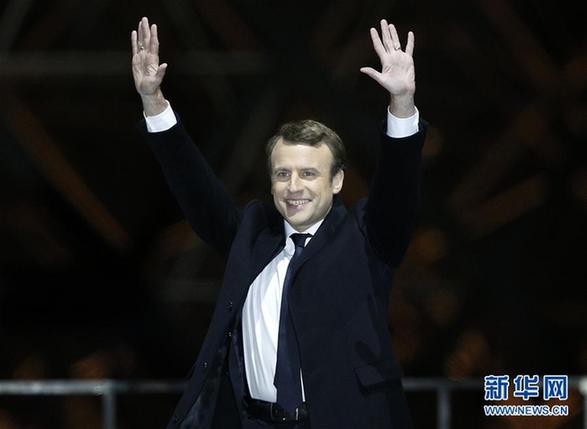Macron falters as his ratings tumble
- By Sumantra Maitra
 0 Comment(s)
0 Comment(s) Print
Print E-mail China.org.cn, August 2, 2017
E-mail China.org.cn, August 2, 2017
|
|
|
French President Emmanuel Macron [Xinhua] |
When Emmanuel Macron, France’s new presidential star, came to the throne, it was amid a huge sigh of relief across Western liberal institutions. Cosmopolitan elites across the Western capitals were congratulating themselves, as the revolt of the “unwashed masses” as they were dubbed, that had inflicted Brexit on the U.K. and led to Donald Trump’s rise, seemed to have been staved off.
Unfortunately, the structural problems and the rot inside the French political system were not likely to disappear just because a smooth technocrat won victory in a divided country. That has become evident through some recent sharp policy u-turns by Macron that have produced a sharp decline in public opinion polls.
Emmanuel Macron reportedly has suffered the worst drop in popularity for a French president in 20 years since Jacques Chirac in 1995. Macron’s approval rating dropped to 54 percent in July, compared to 64 percent in June, according to an Ifop survey published in the French newspaper Journal du Dimanche.
Immediately after coming to power, Macron, riding high on his huge mandate, gave idealistic speeches about leading the world in climate change and then gripping Donald Trump’s hand hard enough to make his knuckles go white. He also took on Russia’s Vladamir Putin, saying France would take unilateral action against Syria’s Russian-supported President Assad if he staged another chemical strike on his people.
However, reality soon bit. Macron faced resistance when he sought to make changes in France’s notorious labor laws and work ethics. His effort to streamline the French military to become a more modern fighting force instead of the lumbering Second World War behemoth that it is, faces resistance from within, with the armed forces chief resigned after a much-publicized spat. Finally, his comments on Africa, migration and foreign aid drew massive criticism from liberals.
In foreign policy especially, he seems to have taken a turn towards realism. He mentioned that Assad’s removal is not a prerequisite of a solution in Syria, which runs counter to EU policy, as well as the stance taken by his predecessor Hollande, the former Obama administration and the British government.
He also said, Russia and Iran need to be parties to any Syria solution, with regional stability more important than promoting democracy in Syria. Finally, he said, in a speech widely misinterpreted in media, that the way to fix Africa’s problems was not to invite its peoples, but by investing in Africa and fixing local jobs problem.
So, why this change? One can argue that a return to realpolitik was inevitable as soon as the honeymoon period ended. The forces that guide geopolitics are economic and strategic, and idealism, while it sounds good in theory, is hard to achieve in practice. Rhetoric and realpolitik isn’t the same and every leader of every political system eventually needs to compromise.
The fact that Macron had to invite Donald Trump may mean that either he is genuinely beginning to like his American counterpart, or recognize his charming ways, which is unlikely; however, the more prosaic explanation is, once in power, Macron is realizing that campaigning is not governing. The latter is a tough act. And although it is attractive to don the garb of the leader of the liberal order, the actual act is much tougher to achieve.
France, just like every other European power, simply lacks the hard power to provide security for Europe. France also lacks the individual economic power of China and India. And frankly, France is not isolated as it has to live inside the international system.
Still, there’s hope. Macron is in the vein of other typical French presidents, grandiloquent, Jupiteresque, nonchalant, and bit posh. There’s a special flavor of French diplomacy, evident ever since the time of Richelieu, the iron hand in a velvet glove type of diplomacy. The latest attempts of Macron to single-handedly attempting to solve the Libyan crisis, by bringing together all the fighting factions, signal such a grand estimation of French hard power.
The only thing we can learn, however, from the disappointment of those who got swept in the Macron mania, is that idealism is easy to sell. Humans like dreaming big things, with little thought to the complexity of real life. As a result, most people, when faced with the fact that the forces of economics and politics are more powerful than individual agency, feel disappointed.
Sumantra Maitra is a columnist with China.org.cn. For more information please visit:
http://www.china.org.cn/opinion/SumantraMaitra.htm
Opinion articles reflect the views of their authors only, not necessarily those of China.org.cn.







Go to Forum >>0 Comment(s)